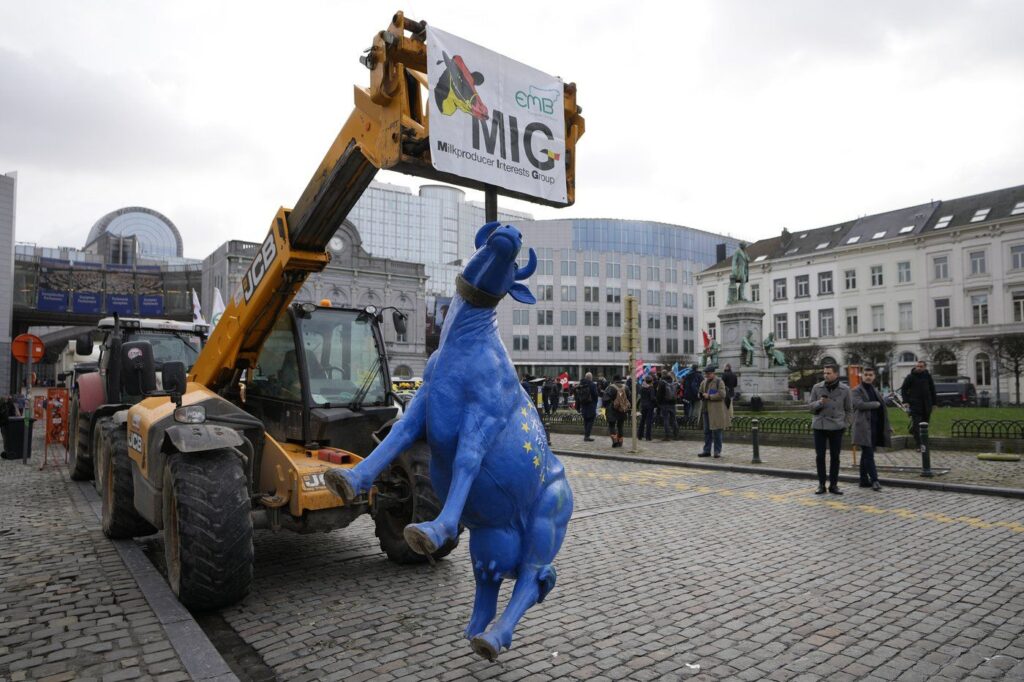

Global HR News
Global HR News
Farmers block roads across France in protest at low wages and the burden of regulation
January 24, 2024
By
The Associated Press
 A plastic cow painted with the colors of the EU flag is held up by a strap from a tractor during a demonstration of French and Belgian farmers outside the European Parliament in Brussels, Wednesday, Jan. 24, 2024. (AP Photo/Virginia Mayo)
A plastic cow painted with the colors of the EU flag is held up by a strap from a tractor during a demonstration of French and Belgian farmers outside the European Parliament in Brussels, Wednesday, Jan. 24, 2024. (AP Photo/Virginia Mayo) PARIS (AP) — With roadblocks and street protests, farmers in France demonstrated Wednesday across the country and in Brussels against low wages and what they see as excessive bureaucracy, part of a rising tide of anger among agricultural producers across the European Union.
There were also demonstrations in Poland, where disgruntled farmers slow-drove their tractors through major cities in protest at what they call “unfair” competition from neighboring Ukraine.
In a sign that the protest movement was expanding in France, roadblocks were spreading in many regions, coming a day after a farmer and her daughter died when a car crashed into a protest barricade in the southwest.
Some staged a protest in Brussels, home to the EU’s headquarters, where French farmers’ union Rural Coordination called for a demonstration against the “ever-increasing constraints of European regulations and ever-lower incomes.”
France, the biggest agricultural producer in the EU, receives a total of 9 billion euros ($9.8 billion) a year in subsidies under the CAP, the Common Agricultural Policy, the largest share of any member state.
“Today, when we see that all the farmers in France are gathering near roundabouts, blocking highways, putting tarpaulins on speed cameras: it shows they are fed up. It’s a revolt,” Veronique Le Floc’h, the president of Rural Coordination, told The Associated Press.
Farmers from all different backgrounds are joining the movement, she said, “because the fight is the same. The money is no longer there.”
Arnaud Rousseau, head of France’s major farmers union FNSEA, said that his organization would release a list of 40 necessary measures later on Wednesday. Speaking on France 2 television, he said that the protest movement was aimed at “getting quick results.”
The protests are the first major challenge for newly appointed Prime Minister Gabriel Attal, who took office two weeks ago, and his government. Attal met with farmers’ unions representatives earlier this week.
Government spokesperson Prisca Thevenot said Wednesday that the government would make new proposals to respond to the crisis “in the coming days.” Announcements were expected to focus on lower fuel prices for farmers and simpler regulations.
“The government is determined to protect the French agricultural model, so that farmers can make a decent living from their work, to simplify their lives and to support them in an environmental transition that will ensure the long-term future of their profession,” Thevenot said.
She added that the government doesn’t intend to ask police to remove farmers’ barricades since the protests are organized “within a legal framework.”
On Tuesday, a car carrying three people rammed into a barricade of straw bales in the town of Pamiers, in the Ariege region of southwestern France. A 36-year-old female farmer was killed. Her 12-year-old daughter died later in a hospital, the local prosecutor said in a statement.
Police detained the three occupants of the car for questioning.
The prosecutor said the three are Armenian nationals who don’t have residence permits in France and had appealed an order to leave French territory. The driver admitted bypassing security barriers that were meant to stop cars from going onto that part of the road.
Farmers’ protests have been staged in recent weeks in Germany, the Netherlands and Romania against EU regulations and other various reasons linked to the local food industry.
In Poland, reacting to the farmers’ protest, Prime Minister Donald Tusk said Wednesday that talks would be held with Ukraine’s government to ensure that agriculture production and the market weren’t threatened by the “uncontrolled inflow of farm produce from Ukraine.”
Fresh from a visit to Kyiv, Tusk said that the Ukrainian authorities “are not interested in the uncontrolled export” of their produce, but want it to be regulated.
Talks will take place in Warsaw in March, Tusk said.
Polish farmers describe competition from Ukraine as “unfair” and denounce EU tax-free trade with the country, saying that it’s undercutting their livelihoods. They are also protesting against European pro-environment regulations, saying it reduces their output and earnings.
The EU last year lifted taxes in trade with Ukraine to help the country’s economy as it is fighting full-scale war against Russia’s aggression.
Print this page